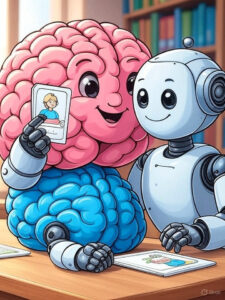Exploring the intersection of biblical prophecy and artificial intelligence in our rapidly evolving digital age
Introduction: The Convergence of Ancient Prophecy and Modern AI
The emergence of artificial intelligence represents one of the most significant technological revolutions in human history, fundamentally reshaping how we work, communicate, and understand our world. As AI systems become increasingly sophisticated, many religious scholars, theologians, and believers are examining these developments through the lens of biblical prophecy. This biblical AI prophecy commentary explores the fascinating intersection between ancient scriptural predictions and our current technological landscape.
The relationship between biblical prophecy and artificial intelligence has sparked intense theological debate across denominations. While some view AI as fulfilling ancient prophecies about end times, others see it as a tool that can enhance human understanding of divine wisdom. This comprehensive analysis examines various interpretations, scholarly perspectives, and the theological implications of our AI-driven future.
Understanding Biblical Prophecy in Historical Context
The Nature of Biblical Prophecy
Biblical prophecy encompasses both foretelling future events and forth-telling divine messages for contemporary audiences. According to Wikipedia’s comprehensive overview of biblical prophecy, these prophetic texts have been interpreted through various hermeneutical approaches throughout church history. The prophetic literature includes books like Daniel, Revelation, Ezekiel, and numerous passages from both Old and New Testaments.
The interpretation of biblical prophecy has evolved significantly over centuries. Early church fathers, medieval theologians, and modern scholars have developed different frameworks for understanding prophetic texts. Some adopt a literalist approach, while others embrace symbolic or metaphorical interpretations. This diversity of interpretation becomes particularly relevant when examining contemporary technological developments.
Prophetic Themes Relevant to AI
Several recurring themes in biblical prophecy appear particularly relevant to discussions about artificial intelligence:
Knowledge and Wisdom Enhancement: Daniel 12:4 states, “Many shall run to and fro, and knowledge shall increase.” Many contemporary commentators interpret this as a prophecy about the information age and artificial intelligence revolution.
Image-Making and False Worship: Revelation 13:14-15 describes the creation of an “image” that could speak and cause people to worship it. Some scholars draw parallels between this passage and advanced AI systems or robotics.
Global Communication and Control: Various prophetic passages describe worldwide communication systems and centralized control mechanisms that some interpret as foreshadowing our interconnected digital age.
Artificial Intelligence: A Technological Overview

The Current State of AI Development
Artificial intelligence has progressed rapidly from simple rule-based systems to sophisticated machine learning models capable of natural language processing, image recognition, and complex problem-solving. According to industry analysis from Forbes’ AI coverage, current AI systems demonstrate capabilities that were purely science fiction just decades ago.
The development trajectory of AI includes several key milestones:
- Machine learning algorithms that can identify patterns in vast datasets
- Natural language processing systems that can engage in human-like conversations
- Computer vision technologies that surpass human visual recognition abilities
- Autonomous systems capable of making complex decisions without human intervention
AI’s Impact on Society and Religion
The integration of AI into various aspects of human life has profound implications for religious practice and theological understanding. Educational institutions are already incorporating AI tools into their curricula, as discussed in our comprehensive guide on classroom technology and mindfulness strategies for educators, which explores how modern technology can enhance both learning and spiritual awareness in educational settings.
AI’s influence extends beyond education into worship practices, biblical study, and theological research. Some religious communities have embraced AI-powered Bible study tools, while others express concern about technology’s role in spiritual matters.
Biblical AI Prophecy Commentary: Key Interpretations
The Daniel 12:4 Perspective
One of the most frequently cited passages in biblical AI prophecy commentary is Daniel 12:4: “But you, Daniel, shut up the words and seal the book, until the time of the end. Many shall run to and fro, and knowledge shall increase.” Many contemporary theologians interpret this verse as a direct prophecy about our current information age.
Scholarly Interpretations:
- Literalist View: This passage literally predicts the exponential growth of human knowledge through technological advancement, including artificial intelligence.
- Symbolic Interpretation: The increase in knowledge refers to spiritual understanding and revelation rather than technological advancement.
- Historical Context: Some scholars argue this passage referred to the Maccabean period and shouldn’t be applied to modern technology.
The phrase “many shall run to and fro” has been interpreted by some as prophetic of our hyperconnected, rapidly moving digital age where information travels instantly across the globe.
Revelation 13 and the Image of the Beast
Revelation 13:14-15 presents one of the most intriguing passages for AI prophecy commentary: “And he deceives those who dwell on the earth by the signs that he was granted to do in the sight of the beast, telling those who dwell on the earth to make an image of the beast who was wounded by the sword and lived. He was granted power to give breath to the image of the beast, that the image of the beast should both speak and cause as many as would not worship the image of the beast to be killed.”
Contemporary Interpretations:
AI Avatar Theory: Some commentators suggest this passage describes advanced AI systems or holographic projections that could simulate human-like interaction and influence.
Robotic Integration: Others interpret the “image” as sophisticated robotics combined with AI that could interact with humans in ways that appear lifelike.
Digital Influence Systems: A broader interpretation suggests this prophecy describes digital influence networks and AI-powered propaganda systems that could manipulate public opinion on a global scale.
The Mark of the Beast and Digital Identity
Revelation 13:16-17 describes a mark required for commercial transactions: “He causes all, both small and great, rich and poor, free and slave, to receive a mark on their right hand or on their foreheads, and that no one may buy or sell except one who has the mark or the name of the beast, or the number of his name.”
Modern AI prophecy commentary often connects this passage to:
- Digital payment systems and cryptocurrency
- Biometric identification technologies
- Social credit systems enhanced by AI surveillance
- Microchip implants for identification and payment
Theological Perspectives on AI Development
Reformed Theology and AI
Reformed theological traditions emphasize God’s sovereignty over all creation, including human technological development. From this perspective, artificial intelligence represents part of God’s providential plan while humans remain responsible for ethical stewardship of these technologies.
Key considerations include:
- Human beings as image-bearers retain unique dignity regardless of AI capabilities
- Technology should serve human flourishing and glorify God
- Wisdom and discernment are required to distinguish beneficial from harmful applications
Catholic Teaching on AI
Catholic social teaching provides a framework for evaluating artificial intelligence through principles of human dignity, subsidiarity, and the common good. The Catholic Church has engaged thoughtfully with AI development while maintaining emphasis on human uniqueness and moral agency.
Evangelical Perspectives
Evangelical Protestant denominations show varied responses to AI development. Some embrace technology as a tool for evangelism and discipleship, while others express concern about AI’s potential to replace human relationships or challenge biblical authority.
Scholarly Analysis: Academic Perspectives on Biblical AI Prophecy
Historical-Critical Methodology
Academic biblical scholarship typically approaches prophetic texts using historical-critical methodology, which examines:
- Original historical context of prophetic writings
- Literary genres and symbolic language
- Development of prophetic traditions over time
- Distinction between original meaning and later interpretations
Most academic scholars caution against direct application of ancient prophetic texts to modern technology without careful consideration of historical context and literary analysis.
Theological Integration Studies
Emerging academic disciplines explore the intersection of theology and technology. Research institutions are examining how artificial intelligence challenges traditional theological categories and what this means for contemporary faith communities.
Areas of scholarly inquiry include:
- AI’s impact on concepts of human uniqueness and dignity
- Theological anthropology in the age of artificial intelligence
- Ethical frameworks for AI development informed by religious tradition
- Prophetic hermeneutics in technological contexts
Practical Implications for Contemporary Faith Communities
Church Leadership and AI
Religious leaders face practical questions about incorporating AI into ministry while maintaining theological integrity. Considerations include:
Sermon Preparation: AI tools can assist with biblical research and sermon development, but questions arise about authenticity and divine inspiration in preaching.
Pastoral Care: AI chatbots and virtual assistants might supplement pastoral counseling, but cannot replace human relationships and spiritual discernment.
Administrative Tasks: Churches can benefit from AI-powered scheduling, communication, and resource management systems.
Educational Integration
Religious educational institutions must navigate AI integration while preserving their formational mission. This challenge mirrors broader educational technology discussions, such as those outlined in classroom technology mindfulness strategies, which emphasize balancing technological tools with human formation and spiritual development.
Evangelism and Discipleship
AI technologies offer new opportunities for evangelism and discipleship:
- Personalized Bible study applications
- AI-powered language translation for cross-cultural ministry
- Virtual reality experiences of biblical narratives
- Intelligent matching systems for discipleship relationships
Ethical Considerations in Biblical AI Commentary
Avoiding Sensationalism
Biblical AI prophecy commentary must avoid sensationalistic interpretations that create fear or manipulate believers. Responsible interpretation requires:
- Careful exegesis of biblical texts
- Consideration of multiple interpretations
- Emphasis on spiritual preparation rather than date-setting
- Integration with broader biblical theological themes
Maintaining Biblical Authority
While exploring connections between prophecy and AI, faith communities must preserve the authority and primacy of Scripture. AI tools should supplement rather than replace biblical study and spiritual discernment.
Social Justice Implications
Biblical prophecy often emphasizes justice for the marginalized and oppressed. AI prophecy commentary should address how artificial intelligence might impact vulnerable populations and what Christian response is required.
Future Directions in Biblical AI Prophecy Commentary
Emerging Technologies
Future developments in artificial intelligence will likely generate new questions for biblical prophecy interpretation:
- Quantum computing capabilities
- Brain-computer interfaces
- Advanced robotics and automation
- Artificial general intelligence (AGI)
Theological Development
Theological reflection on AI will continue evolving as technology advances. Areas requiring ongoing development include:
- Pneumatology (theology of the Holy Spirit) and AI consciousness questions
- Eschatology (end times theology) and technological fulfillment
- Ethics and AI decision-making frameworks
- Theological anthropology and human-AI relationships
Interdisciplinary Collaboration
Future biblical AI prophecy commentary will benefit from collaboration between:
- Biblical scholars and computer scientists
- Theologians and AI ethicists
- Church leaders and technology developers
- Academic researchers and practicing ministers
Global Perspectives on AI and Prophecy
International Christian Communities
Christian communities worldwide bring diverse cultural perspectives to AI and biblical prophecy interpretation. These varied viewpoints enrich global theological discussion while highlighting universal themes of human dignity and divine sovereignty.
Interfaith Dialogue
AI development affects all religious traditions, creating opportunities for interfaith dialogue about technology’s role in human flourishing and spiritual development. Biblical AI prophecy commentary can contribute to broader conversations about technology and transcendence.
Conclusion: Wisdom for the Digital Age
Biblical AI prophecy commentary offers valuable insights for navigating our rapidly changing technological landscape. Whether one interprets prophetic texts as literally predicting artificial intelligence or views them as providing wisdom principles for any era, these ancient writings remain relevant for contemporary faith communities.
The key to faithful biblical AI prophecy commentary lies in maintaining both theological integrity and practical wisdom. This means:
- Careful biblical interpretation that respects historical context
- Thoughtful engagement with technological development
- Emphasis on spiritual preparation and faithfulness
- Commitment to human dignity and social justice
- Integration of ancient wisdom with contemporary challenges
As artificial intelligence continues advancing, faith communities must remain grounded in biblical truth while thoughtfully engaging emerging realities. The intersection of biblical prophecy and AI technology challenges believers to exercise discernment, pursue wisdom, and maintain hope in God’s ultimate sovereignty over human history.
Through responsible biblical AI prophecy commentary, contemporary Christians can navigate technological change while preserving essential elements of their faith tradition. This balance requires ongoing dialogue between theological reflection and practical application, ensuring that ancient wisdom informs modern decisions about artificial intelligence’s role in human flourishing.
The future relationship between biblical prophecy and artificial intelligence remains an open question requiring continued study, prayer, and discernment from faithful believers committed to both scriptural truth and responsible engagement with technological advancement. As we move forward in this digital age, may our response be characterized by wisdom, love, and unwavering trust in God’s providential care for creation.
This biblical AI prophecy commentary represents ongoing theological reflection rather than definitive interpretation. Readers are encouraged to engage in personal study, seek pastoral guidance, and participate in community discussion as they develop their own understanding of these important issues.




